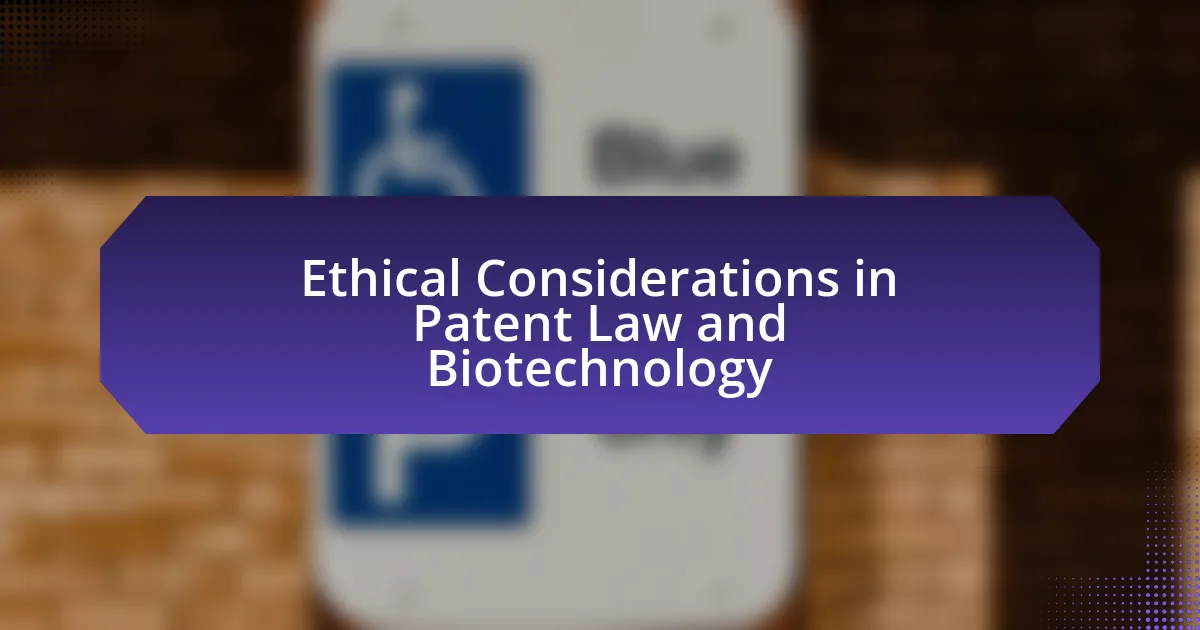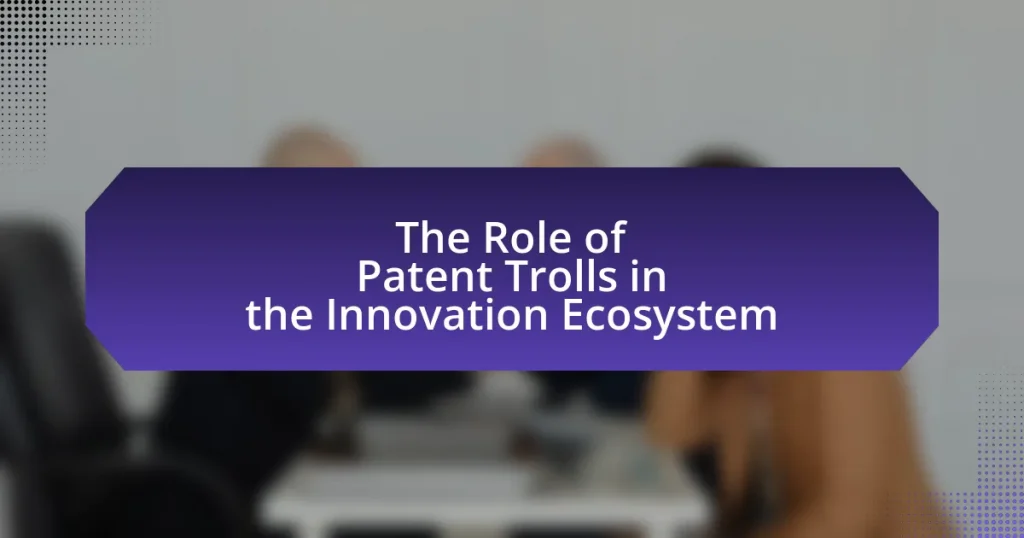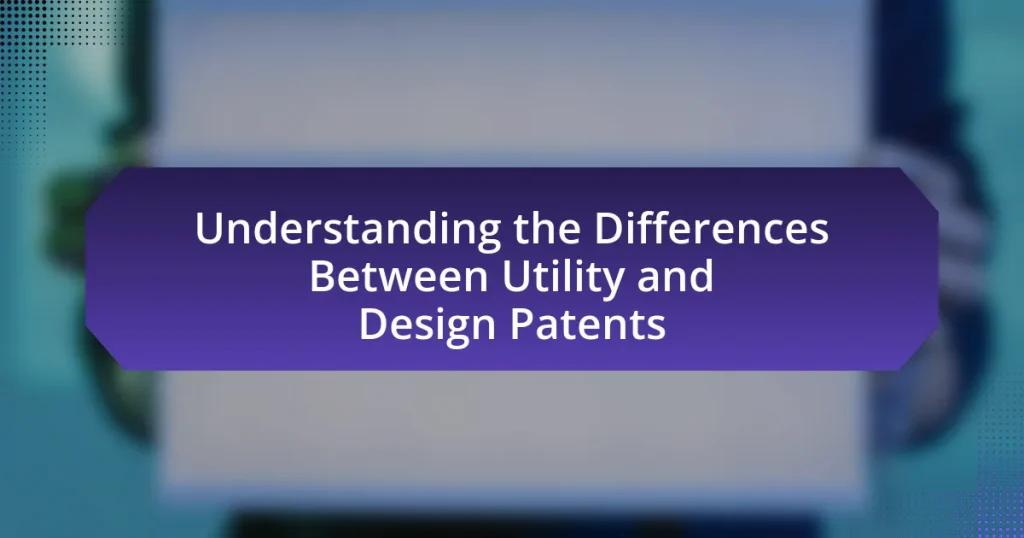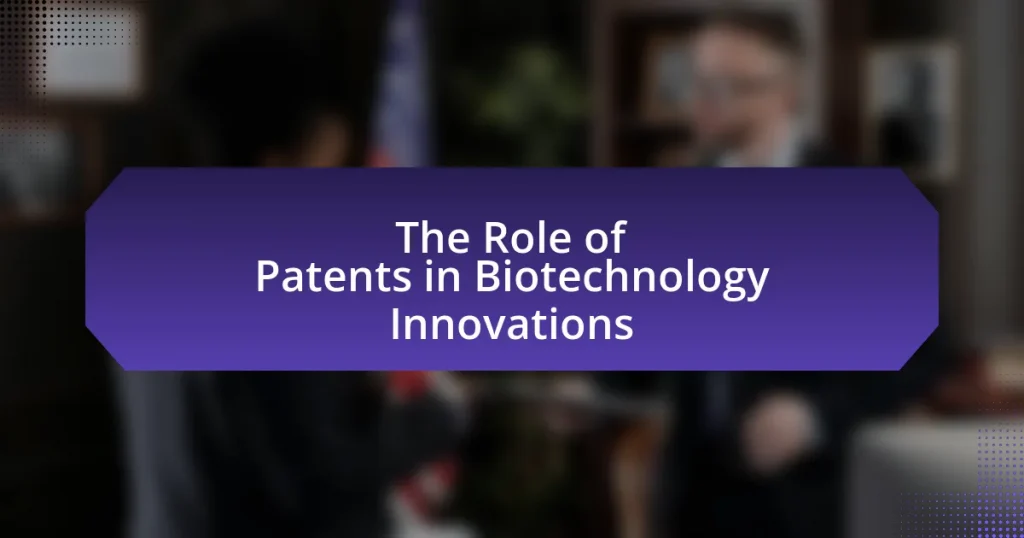The article focuses on the ethical considerations in patent law and biotechnology, emphasizing issues such as access, equity, and the moral implications of patenting living organisms and genetic materials. It explores the impact of patent law on healthcare accessibility, the commodification of life forms, and the ethical dilemmas arising from monopolistic practices. Key ethical principles, including justice, beneficence, and respect for autonomy, are discussed in relation to patent law decisions and regulatory frameworks. The article also addresses the challenges of balancing commercial interests with ethical standards, the role of informed consent, and the influence of public opinion on future patent laws.
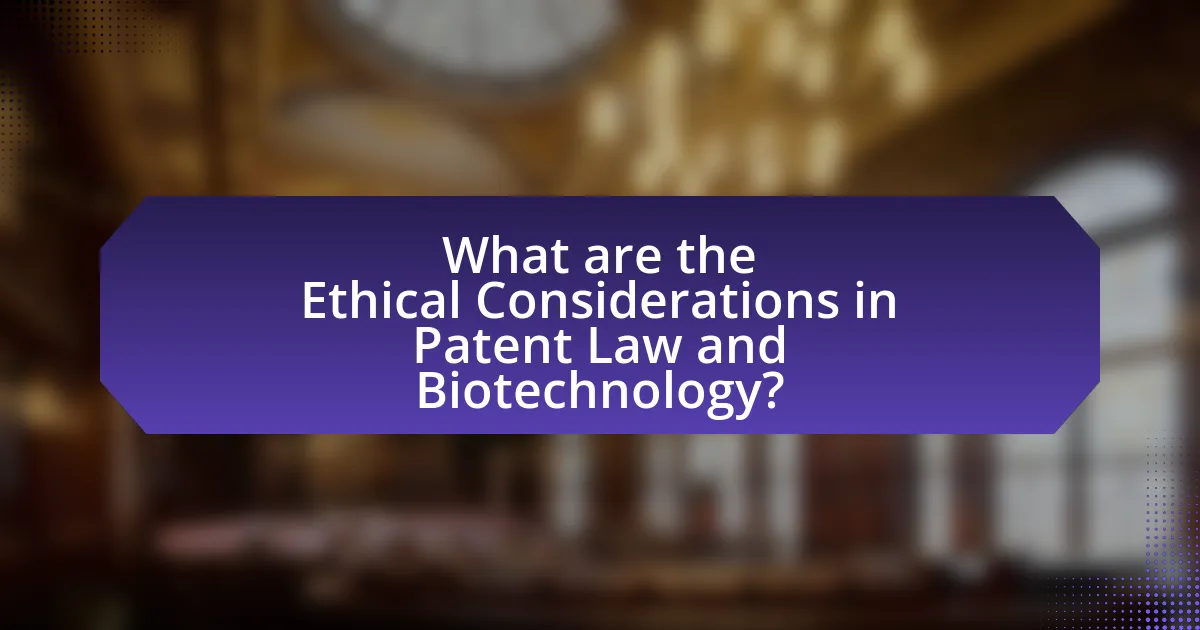
What are the Ethical Considerations in Patent Law and Biotechnology?
Ethical considerations in patent law and biotechnology primarily revolve around issues of access, equity, and the moral implications of patenting living organisms and genetic materials. Patent law can create barriers to access for essential biotechnological innovations, particularly in healthcare, where patented treatments may be unaffordable for low-income populations. Additionally, the patenting of genetic materials raises ethical questions about ownership and the commodification of life forms, as seen in cases like the Myriad Genetics patent on BRCA genes, which limited access to genetic testing. These considerations highlight the need for a balance between incentivizing innovation and ensuring public access to biotechnological advancements.
Why is ethics important in the context of patent law and biotechnology?
Ethics is crucial in the context of patent law and biotechnology because it ensures that innovations are developed and utilized responsibly, balancing the interests of inventors, society, and public health. Ethical considerations guide the patenting process to prevent monopolization of essential biotechnological advancements, such as life-saving drugs and agricultural innovations, which could otherwise restrict access and exacerbate inequalities. For instance, the World Health Organization emphasizes the need for ethical frameworks to govern biotechnological patents to promote equitable access to healthcare and prevent exploitation of genetic resources.
What ethical dilemmas arise from patenting biotechnological inventions?
Patenting biotechnological inventions raises several ethical dilemmas, primarily concerning access to essential medicines, the commodification of life forms, and the potential for monopolistic practices. Access to essential medicines can be restricted when patents lead to high prices, limiting availability for low-income populations, as seen with patented HIV/AIDS treatments that are unaffordable in many developing countries. The commodification of life forms occurs when living organisms, such as genetically modified crops or human genes, are treated as property, raising concerns about the moral implications of owning life itself. Additionally, monopolistic practices can stifle innovation and competition, as patent holders may prioritize profit over public health needs, evidenced by the limited availability of certain biotechnological advancements due to restrictive licensing agreements. These dilemmas highlight the complex interplay between innovation, ethics, and public welfare in the realm of biotechnology.
How do ethical considerations influence patent law decisions?
Ethical considerations significantly influence patent law decisions by shaping the criteria for what can be patented and guiding the interpretation of patentability standards. For instance, ethical concerns regarding public health, environmental impact, and access to essential medicines often lead lawmakers and courts to restrict patents on certain biotechnological inventions, such as genetic materials or life forms. A notable example is the U.S. Supreme Court’s decision in Association for Molecular Pathology v. Myriad Genetics, which ruled that naturally occurring genes cannot be patented, reflecting ethical considerations about the ownership of human genetic information. This decision illustrates how ethical frameworks can directly impact legal interpretations and the scope of patent law, ensuring that societal values are considered in the patenting process.
What are the key ethical principles relevant to patent law and biotechnology?
The key ethical principles relevant to patent law and biotechnology include justice, beneficence, non-maleficence, and respect for autonomy. Justice pertains to equitable access to biotechnological advancements and ensuring that patents do not disproportionately benefit certain groups over others. Beneficence emphasizes the obligation to promote the well-being of individuals and society through the responsible use of biotechnological innovations. Non-maleficence focuses on the duty to avoid harm, ensuring that patented biotechnological products do not pose risks to health or the environment. Respect for autonomy involves acknowledging the rights of individuals to make informed decisions regarding their own biological materials and genetic information. These principles guide ethical decision-making in the intersection of patent law and biotechnology, ensuring that innovations serve the public good while respecting individual rights.
How do principles of justice and equity apply to biotechnology patents?
Principles of justice and equity in biotechnology patents emphasize fair access to biotechnological innovations and the equitable distribution of benefits derived from these inventions. These principles advocate that patent systems should not disproportionately favor wealthy entities or countries, ensuring that marginalized populations also benefit from advancements in biotechnology, such as medical treatments and agricultural improvements. For instance, the World Health Organization highlights the need for equitable access to vaccines and treatments, particularly in low-income regions, to address health disparities. Thus, applying justice and equity principles in biotechnology patents involves creating frameworks that promote inclusivity and fairness in the distribution of biotechnological advancements.
What role does informed consent play in biotechnological research and patents?
Informed consent is crucial in biotechnological research and patents as it ensures that participants are fully aware of the nature, risks, and implications of their involvement. This ethical requirement protects individual autonomy and promotes transparency, allowing participants to make informed decisions about their contributions to research. For instance, the Declaration of Helsinki emphasizes the necessity of informed consent in medical research, highlighting that participants must understand the potential uses of their biological materials, including any future patent applications. This practice not only safeguards the rights of individuals but also enhances the credibility of research findings, as ethical compliance is increasingly scrutinized in patent applications and funding processes.
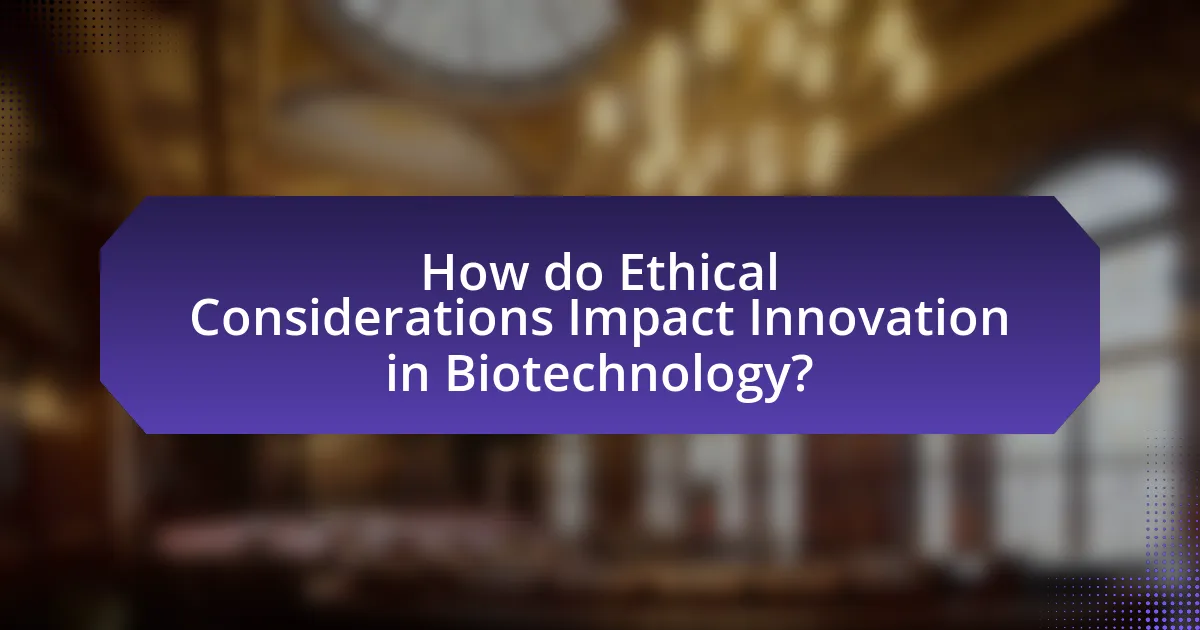
How do Ethical Considerations Impact Innovation in Biotechnology?
Ethical considerations significantly impact innovation in biotechnology by shaping research priorities, regulatory frameworks, and public acceptance. These considerations often dictate the boundaries of acceptable research practices, influencing funding allocation and the direction of scientific inquiry. For instance, ethical debates surrounding genetic modification and stem cell research can lead to stringent regulations that either promote or hinder innovation. A notable example is the 2015 decision by the National Institutes of Health to lift the moratorium on funding for research involving human embryonic stem cells, which subsequently spurred advancements in regenerative medicine. Thus, ethical considerations serve as both a catalyst and a constraint in the biotechnology sector, directly affecting the pace and nature of innovation.
What are the potential consequences of ethical lapses in patent law?
Ethical lapses in patent law can lead to significant consequences, including the undermining of public trust in the patent system. When patent attorneys or applicants engage in unethical practices, such as submitting false information or failing to disclose relevant prior art, it can result in the issuance of invalid patents. This not only stifles innovation by creating barriers for legitimate competitors but also leads to costly litigation and potential monopolies on essential technologies. For instance, a study by the National Academy of Sciences highlighted that unethical patent practices can hinder advancements in biotechnology, ultimately affecting public health and safety.
How can unethical patent practices hinder scientific progress?
Unethical patent practices can significantly hinder scientific progress by restricting access to essential research tools and knowledge. When patents are used to block competitors or to create monopolies, they limit collaboration and the sharing of information, which are crucial for innovation. For instance, the practice of patenting fundamental scientific discoveries, such as the BRCA1 gene associated with breast cancer, has led to restricted access to genetic testing and research, ultimately delaying advancements in medical treatments. This monopolization can stifle creativity and discourage researchers from pursuing new ideas, as they may fear legal repercussions or financial barriers associated with existing patents.
What are the implications for public trust in biotechnology?
Public trust in biotechnology is significantly influenced by ethical considerations surrounding patent law. When biotechnology companies prioritize profit over ethical practices, public skepticism increases, leading to diminished trust. For instance, controversies over gene patenting have raised concerns about accessibility and the commodification of life forms, which can alienate the public. Research indicates that transparency in biotechnological processes and ethical patenting practices can enhance public confidence, as seen in surveys where 70% of respondents expressed greater trust in companies that openly share their research and development practices. Thus, ethical considerations in patent law directly impact public trust in biotechnology, shaping perceptions and acceptance of biotechnological advancements.
How do ethical considerations shape regulatory frameworks in biotechnology?
Ethical considerations significantly shape regulatory frameworks in biotechnology by guiding the development of laws and policies that ensure responsible research and application of biotechnological innovations. These frameworks often incorporate ethical principles such as respect for human dignity, environmental sustainability, and social justice, which influence decisions on issues like genetic modification, cloning, and access to biotechnological advancements. For instance, the European Union’s regulations on genetically modified organisms (GMOs) reflect ethical concerns about safety, environmental impact, and consumer rights, demonstrating how ethical considerations directly inform regulatory practices.
What regulations exist to ensure ethical patent practices in biotechnology?
Regulations that ensure ethical patent practices in biotechnology include the Bayh-Dole Act, which allows universities and small businesses to retain ownership of inventions developed with federal funding, promoting innovation while ensuring public access to research outcomes. Additionally, the Patent Cooperation Treaty (PCT) provides a framework for international patent protection, encouraging ethical standards across member countries. The U.S. Patent and Trademark Office (USPTO) also enforces guidelines that require patent applications to disclose sufficient information about the invention, ensuring transparency and preventing the patenting of naturally occurring substances. These regulations collectively aim to balance the interests of inventors with public welfare and access to biotechnological advancements.
How do international treaties address ethical issues in biotechnology patents?
International treaties address ethical issues in biotechnology patents primarily through frameworks that promote responsible innovation and equitable access. For instance, the Agreement on Trade-Related Aspects of Intellectual Property Rights (TRIPS) establishes minimum standards for patent protection while allowing member countries to implement measures that reflect ethical considerations, such as public health and environmental sustainability. Additionally, the Convention on Biological Diversity (CBD) emphasizes the importance of fair and equitable sharing of benefits arising from genetic resources, thereby addressing ethical concerns related to biopiracy and the exploitation of indigenous knowledge. These treaties collectively guide nations in balancing patent rights with ethical obligations, ensuring that biotechnology advancements do not compromise societal values or environmental integrity.
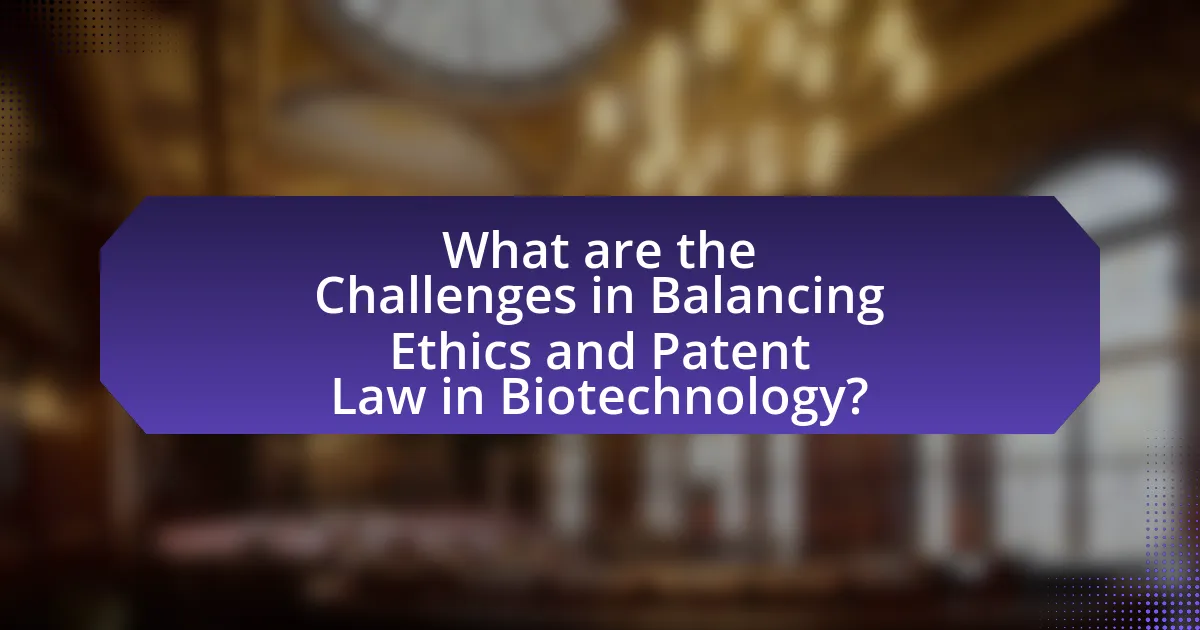
What are the Challenges in Balancing Ethics and Patent Law in Biotechnology?
The challenges in balancing ethics and patent law in biotechnology include the potential for monopolization of essential biotechnological innovations and the ethical implications of patenting life forms. Patent law can incentivize innovation by granting exclusive rights, but this exclusivity may hinder access to critical medical treatments and agricultural advancements, particularly in developing countries. For instance, the patenting of genetically modified organisms can lead to ethical concerns regarding biodiversity and the rights of indigenous communities. Additionally, the complexity of biotechnological inventions often raises questions about the moral implications of ownership over living entities, which can conflict with ethical standards that prioritize public health and environmental sustainability.
What conflicts arise between commercial interests and ethical standards?
Conflicts between commercial interests and ethical standards often arise in the biotechnology sector, particularly regarding patent law. Companies may prioritize profit maximization, leading to practices such as patenting essential medicines or genetic resources, which can restrict access for patients and researchers. For instance, the high costs associated with patented drugs can limit availability in low-income countries, raising ethical concerns about equity and access to healthcare. Additionally, the pursuit of profit can lead to unethical research practices, such as inadequate informed consent or exploitation of vulnerable populations in clinical trials. These conflicts highlight the tension between the drive for innovation and the need to uphold ethical standards that prioritize public welfare and social responsibility.
How do profit motives affect ethical decision-making in biotechnology?
Profit motives significantly influence ethical decision-making in biotechnology by prioritizing financial gain over ethical considerations. Companies may prioritize profit by engaging in practices such as aggressive patenting, which can limit access to essential biotechnological innovations, thereby raising ethical concerns about equity and public health. For instance, the high costs associated with patented biopharmaceuticals can restrict access for low-income populations, leading to ethical dilemmas regarding the right to health. Additionally, profit-driven motives can lead to the manipulation of research outcomes or the underreporting of negative results, compromising scientific integrity and public trust. These dynamics illustrate how the pursuit of profit can overshadow ethical responsibilities in the biotechnology sector.
What are the challenges of enforcing ethical standards in patent law?
Enforcing ethical standards in patent law faces significant challenges, primarily due to the complexity of balancing innovation with public interest. Patent systems often prioritize economic incentives for inventors, which can lead to ethical dilemmas, such as the potential for monopolistic practices and the prioritization of profit over accessibility. For instance, the patenting of life-saving medications can restrict access for low-income populations, raising ethical concerns about equity in healthcare. Additionally, the subjective nature of what constitutes “ethical” can vary across jurisdictions and cultures, complicating enforcement efforts. The lack of uniform guidelines and the influence of powerful corporate interests further hinder the establishment of consistent ethical standards in patent law.
How can stakeholders address ethical challenges in biotechnology patents?
Stakeholders can address ethical challenges in biotechnology patents by implementing transparent practices and engaging in collaborative decision-making. Transparency in patent applications allows for public scrutiny, which can help identify potential ethical issues early in the process. Collaborative decision-making among scientists, ethicists, and policymakers ensures diverse perspectives are considered, leading to more ethically sound outcomes. For instance, the establishment of ethical review boards can provide oversight and guidance on the implications of biotechnological innovations, as seen in the practices of organizations like the National Institutes of Health, which emphasizes ethical considerations in research funding and patenting.
What best practices can researchers adopt to ensure ethical compliance?
Researchers can adopt several best practices to ensure ethical compliance, including obtaining informed consent, ensuring transparency in research methods, and adhering to institutional review board (IRB) guidelines. Informed consent involves clearly communicating the purpose, risks, and benefits of the research to participants, allowing them to make an educated decision about their involvement. Transparency in research methods fosters trust and accountability, as researchers disclose their methodologies and potential conflicts of interest. Adhering to IRB guidelines ensures that research involving human subjects meets ethical standards, protecting participants’ rights and welfare. These practices are supported by ethical frameworks established by organizations such as the American Psychological Association and the National Institutes of Health, which emphasize the importance of ethical conduct in research.
How can policymakers promote ethical considerations in patent law?
Policymakers can promote ethical considerations in patent law by implementing guidelines that prioritize public interest and equitable access to innovations. These guidelines can include mandatory ethical reviews for patent applications, ensuring that inventions do not exploit vulnerable populations or the environment. For instance, the World Health Organization emphasizes the importance of equitable access to healthcare innovations, which can be supported by patent policies that encourage affordable pricing and accessibility. Additionally, policymakers can foster transparency in the patent process, requiring disclosure of the social and environmental impacts of patented technologies. This approach aligns with the principles of responsible innovation, as outlined in the European Commission’s guidelines on ethical research and innovation. By integrating these measures, policymakers can ensure that patent law serves not only economic interests but also ethical imperatives.
What are the Future Directions for Ethical Considerations in Patent Law and Biotechnology?
Future directions for ethical considerations in patent law and biotechnology include the need for enhanced transparency in patent applications and a reevaluation of the criteria for patentability, particularly concerning genetic materials and biotechnological inventions. As biotechnology advances, ethical dilemmas arise regarding ownership of genetic resources and the implications of patenting life forms. For instance, the ongoing debate surrounding CRISPR technology highlights the necessity for clear ethical guidelines to prevent misuse and ensure equitable access. Furthermore, international harmonization of patent laws is essential to address disparities in how different jurisdictions handle biotechnological patents, promoting fairness and ethical standards globally. These directions are supported by ongoing discussions in academic and legal circles, emphasizing the importance of aligning patent law with ethical principles in biotechnology.
How might emerging technologies influence ethical debates in biotechnology patents?
Emerging technologies significantly influence ethical debates in biotechnology patents by introducing complex issues related to ownership, access, and the implications of genetic manipulation. For instance, advancements in CRISPR gene-editing technology raise questions about the morality of patenting genetic modifications that could affect human health and biodiversity. The U.S. Supreme Court’s 2013 decision in Association for Molecular Pathology v. Myriad Genetics established that naturally occurring genes cannot be patented, yet the rapid evolution of synthetic biology challenges existing legal frameworks and ethical norms. This ongoing evolution necessitates a reevaluation of patent laws to address concerns about equitable access to biotechnological innovations and the potential for monopolization of essential medical treatments.
What role will public opinion play in shaping future patent laws?
Public opinion will significantly influence the development of future patent laws, particularly in the context of biotechnology. As societal values and ethical considerations evolve, public sentiment can drive legislative changes, reflecting the demand for more equitable and transparent patent systems. For instance, increasing public concern over issues like access to life-saving medications and genetic resources has prompted discussions around reforming patent laws to prioritize public health and ethical standards. Historical examples, such as the backlash against high drug prices, demonstrate how public advocacy can lead to legislative scrutiny and amendments in patent regulations, emphasizing the importance of public opinion in shaping legal frameworks.
